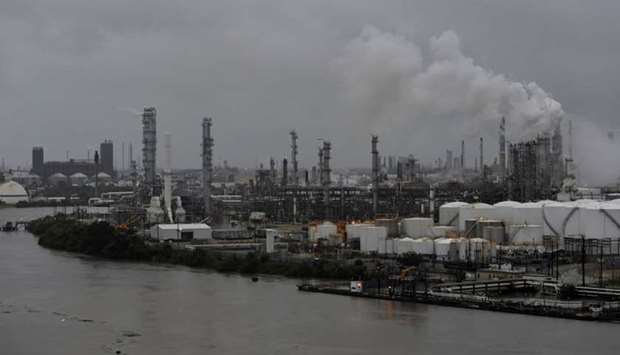* Rebels attack oil pipeline in Colombia
* Operations in Libya still impacted by pipeline blockade
* WTI discount to Brent crude hits 2 year high
Flooding from tropical storm Harvey caused ongoing large-scale US refinery outages on Tuesday, while crude prices rose on the back of supply disruptions in Colombia and Libya.
Refinery shutdowns from the storm helped push US gasoline prices to $1.7799 per gallon on Monday, the most since 2015, although they receded slightly to $1.7342 per gallon by 0648 GMT on Tuesday.
US West Texas Intermediate (WTI) crude rose 30 cents, or 0.6 percent, to $46.87 a barrel, after falling more than 2 percent in the previous session.
International Brent crude futures were up 29 cents, or 0.6 percent, at $52.18 per barrel.
Massive floods caused by Harvey forced several US Gulf coast refineries to close, and while some refineries were starting to prepare for re-starts, heavy rains are expected to last through Wednesday after already causing catastrophic flooding in houston.
Harvey, which has been downgraded to a tropical storm from a hurricane, has affected oil refiners more than crude producers.
"Around 2-3 million bpd of refining capacity is offline or in the process of shutting down... (and) more than 500,000 bpd of oil production... is offline," Barclays bank said.
It added that the storm's impact would "linger for several more weeks."
Greg McKenna, chief market strategist at futures brokerage AxiTrader said the refinery outages would "see crude inventories build up."
The United States has 141 oil refineries as of Jan. 1, with a total capacity of 18.6 million bpd, according to the Energy Information Administration. Texas is home to 30 of those with a capacity of 5.7 million bpd.
The expected US crude build-up on Tuesday widened the WTI discount to Brent to $5.64 per barrel, its widest in over two years.
"Rising US production, domestic refinery blending constraints, and the end of (the) driving season combined to depress WTI," ING bank said.
Crude markets were also looking at disruptions in Libya and Colombia.
In Libya, the 120,000 bpd Zawiya oil refinery was working at only half its capacity due to the shutdown at the Sharara oilfield, according to a refinery source.
Sharara, which at 280,000 bpd is the Opec member's largest oilfield, has been shut for around a week because of militia blocking a pipeline linking it to the Zawiya oil terminal.
In Colombia, a bomb attack by leftist ELN rebel group has halted pumping operations along the country's second-largest oil pipeline, the 210,000 bpd Cano-Limon Covenas, sources from the military and state oil company Ecopetrol said.
Despite these disruptions, crude remains in ample supply, resulting in low prices.
"We are thus lowering our Brent oil price estimates to $55 per barrel from $60 per barrel in 4Q17 (and) to $57 per barrel from $64 per barrel in 2018," Jefferies bank said.

